2050 H.2.O Conflicts
"To care about climate change, you only have to be one thing: a human living on planet Earth. And we're all that."
— Katharine Hayhoe, Climate Scientist
In a probable future where water scarcity makes water more valuable than oil, geopolitical tensions rise as the competition for water becomes central to survival. Global security is threatened by conflicts over water, leading to transboundary disputes and mass migrations that accelerate rapid urbanisation.
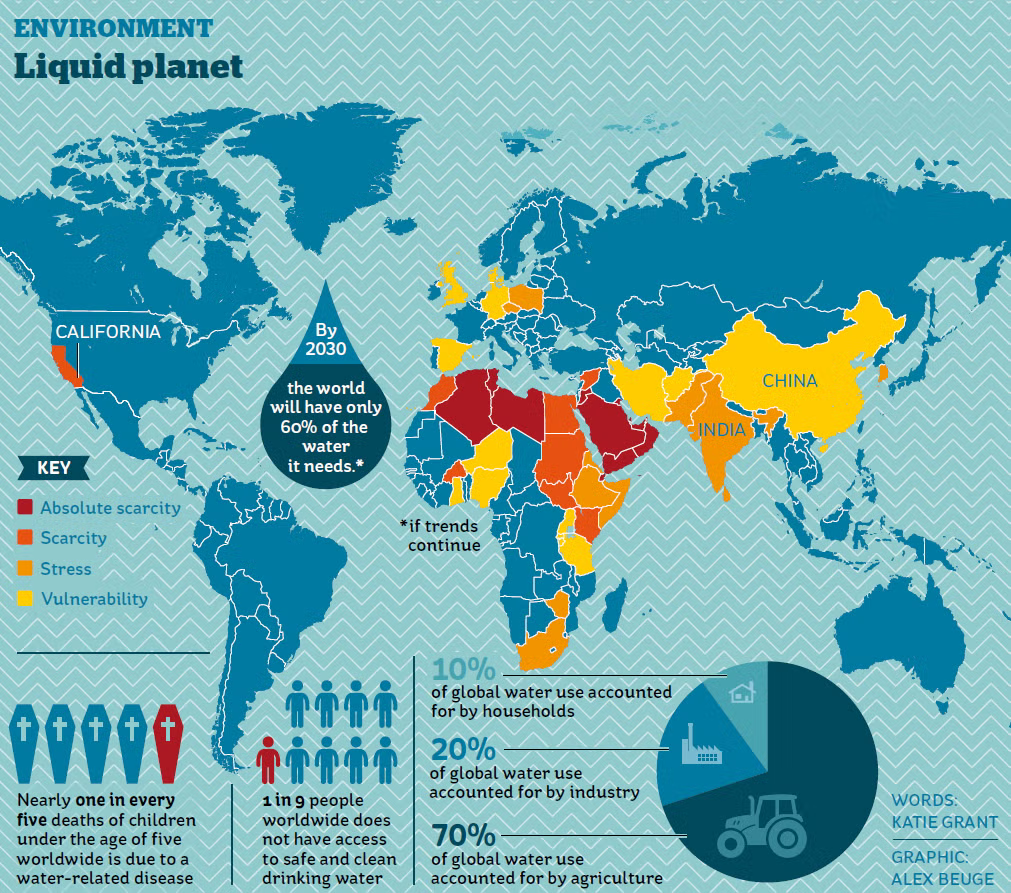
By 2030 The world will have 60% of the water it needs. Image and content by Alex Beuge and Katie Grant.
We haven’t scratched the surface yet. What happens to the animals? Oscar-winning animated, silent documentary, Flow (2008), directed by Irena Salina took the time to consider. To truly prepare for the entirety of this reality, Climate change efforts must, therefore, be at the forefront of our global priorities. According to a 2021 report from the World Meteorological Organisation (WMO), by 2050, up to 5 billion people could struggle to access water (WMO, 2021).
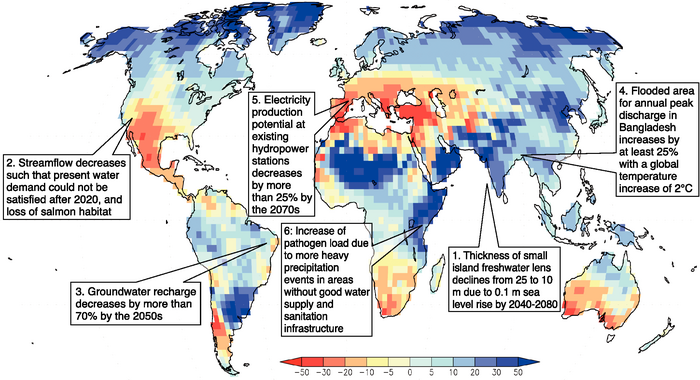
Fresh Water Resources and Their Management Sourced from IPCC.
A Hotter World, A Drier Future
As global temperatures rise, weather patterns are disrupted, and evaporation rates increase, leading to a systemic decline in available water for both environmental and human use. Heatwaves place immense stress on already fragile water supplies, making the challenge of equitable water distribution more pressing than ever.
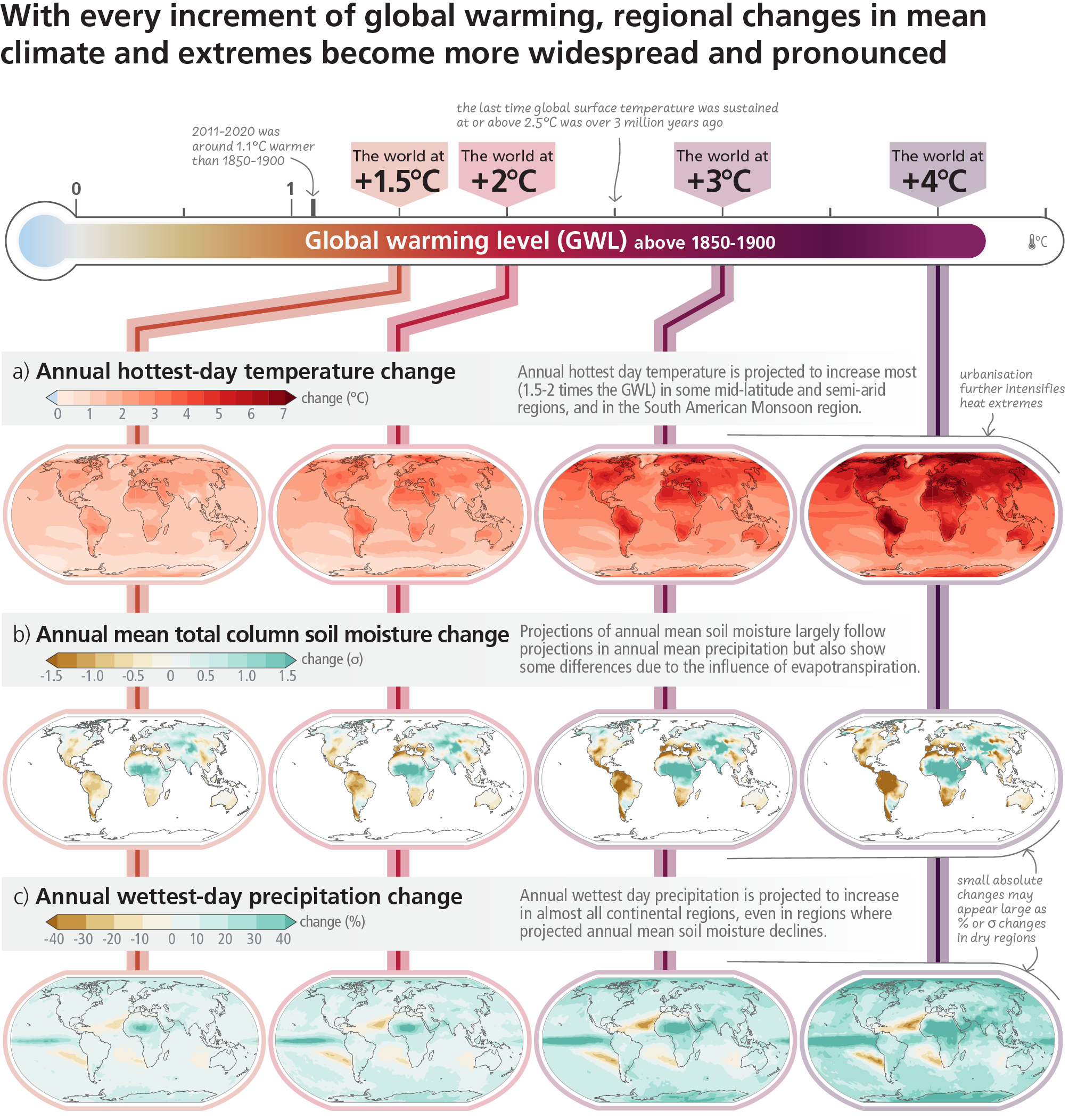
IPCC AR6 SYR SPM Synthesis Report Showing the influence of global warming article .
Changes in Rainfall Patterns
Erratic shifts between flooding and prolonged droughts strain resource management. Rising sea levels and altered river flows—driven by melting glaciers and ice caps—impact freshwater availability. Saltwater intrusion into coastal aquifers poses a growing threat to coastal communities and ecosystems. A NASA-Department of Defense study warns that by 2100, saltwater will widely contaminate coastal groundwater reserves, posing significant risks (NASA, 2021). In South Africa, regions like the Cape Flats must remain vigilant against seawater intrusion.
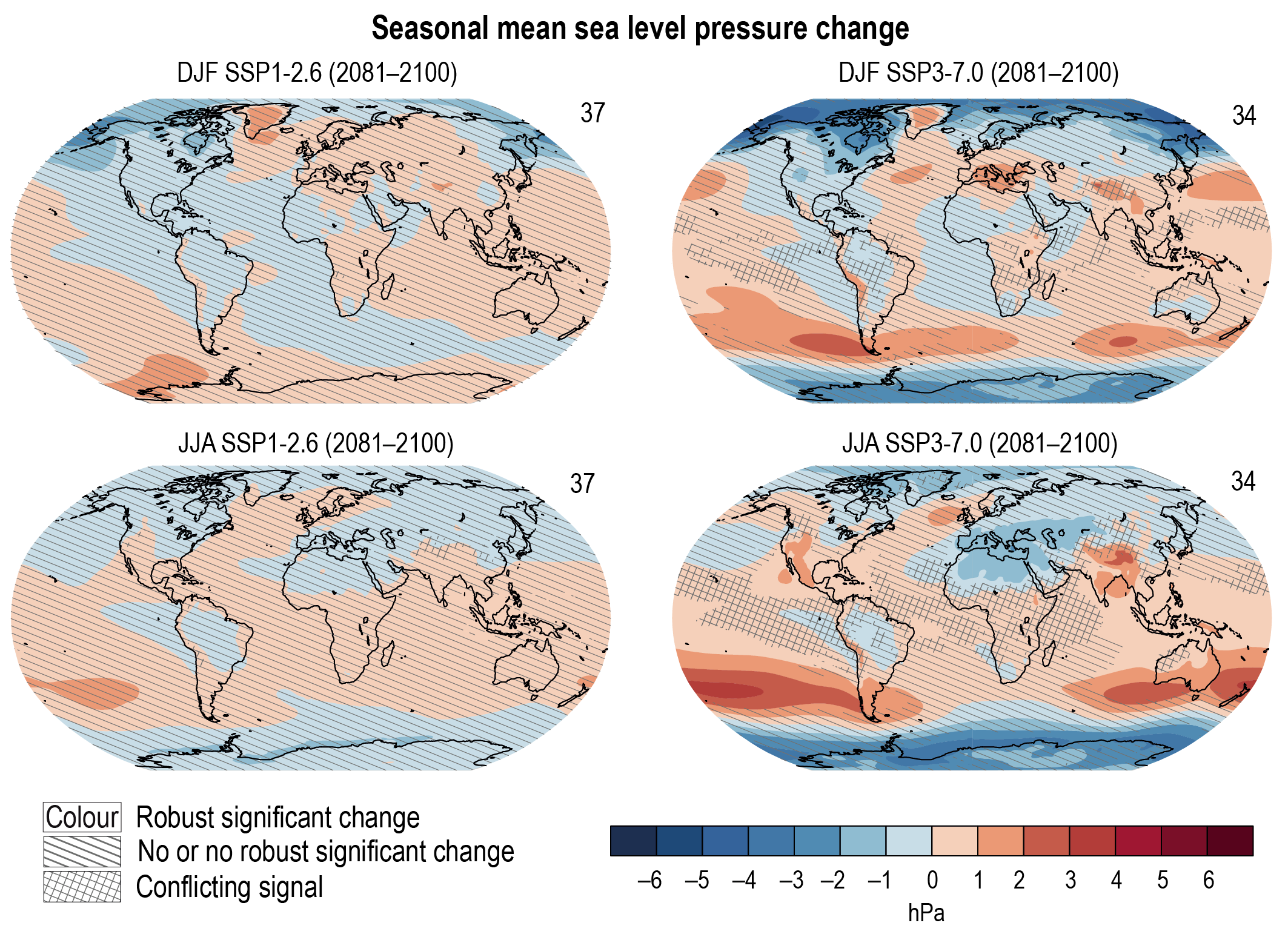
Sea Level Change Over Time. Sourced from the IPCC.
A Challenged Food Basket at the Front Door
The Philippi Horticultural Area in Cape Town, South Africa, plays a vital role in local food security, supplying fresh produce to low-income communities. Climatologists predict frequent and intense future droughts that will threaten farmers’ ability to irrigate their crops. Inconsistent rainfall disrupts traditional farming practices, reducing crop yields and threatening food supply chains. The degradation of soil quality due to climate change necessitates urgent soil protection strategies to preserve microbial life and ensure long-term agricultural sustainability. Meanwhile, urban sprawl encroaches on farmlands, and water resources are stretched thin as informal settlements grow. Water pollution from these settlements further endangers both soil and human health, increasing the risk of food contamination and disease outbreaks. Nazeer Sonday, a regenerative small-scale farmer and chairperson of the PHA Food & Farming Campaign, has been vocal about the potential threats. He believes that proposed urban developments could deplete the Cape Flats Aquifer and encroach upon vital agricultural land, warning of the disastrous effects property development could have on Cape Flats’ aquifers. For a community like Philippi, reliance on food imports would be unsustainable, as it leads to increased costs and economic instability. The livelihoods of farmers and pastoralists are increasingly at risk.
Policy and Corporate Interventions
Local policies have adapted as swiftly as possible to address the complex interplay of climate change, urbanisation, and food security. Companies like Woolworths have contributed to labour, and water infrastructure in schools, and the South African Department of Water and Sanitation (DWS) continues its efforts in water conservation and sustainable management. The South African DWS website serves as an official government repository for data on sustainable water management, infrastructure development, and long-term water security strategies. Their initiatives include:
- Public awareness campaigns to encourage water conservation
- Leak detection and repair programs to reduce water losses
- Implementation of water-efficient technologies
- The ‘Save Water Ambassador Program’ to engage communities in conservation efforts
South African universities are also active in public awareness initiatives, such as the University of South Africa’s "Citizen Science for Water Photo Story Competition," which educates the public on water issues. Civil society organisations work alongside international bodies, governments, and research institutions like the Water Research Commission and UNESCO’s Intergovernmental Hydrological Program to address these challenges.
The Wider African Context
Elsewhere in Africa, extremist groups exploit water scarcity to recruit disenfranchised youth, using control over water as a means of gaining influence. The Lake Chad Basin is a stark example: the lake’s drying up, exacerbated by climate change, has led to increased conflicts among communities that depend on it for survival.
"Sincerely speaking, we are facing a very difficult condition. Our income has gone down. Poverty is seen in our homes. This was not our lot in the 1960s. At the time, the lake was full to its capacity, we were making a lot of money; I can't give figures now."
— Garba Bundaram
"One of the problems we now face is that there is no specific boundary between Nigeria and Chad. We want to know the limit of Nigeria's boundary, and where that of Chad begins and ends. Chadians claim that the areas we believe belong to Nigeria are theirs. Their security operatives assault us very often, beating us and chasing us from our occupation."
— Umar Ali, Fisherman
"Now the lake has receded again. Where we were farming is turning into a desert gradually. Where only one farmer used to cultivate in the past is now being shared by as many as 10 farmers. So we are facing what we may term as the scarcity of fertile land."
— Audu Ibrahim, Farmer
Global Imperatives
To combat these looming crises, the world needs to act decisively:
1. Strengthen international agreements on water management and equitable distribution
2. Mediate transboundary water disputes
3. Invest in sustainable water technologies such as desalination, water recycling, and precision irrigation
4. Fund water technologies in vulnerable regions
5. Reduce greenhouse gas emissions to mitigate climate change’s impact on water resources
6. Develop drought-resistant crops and improve water infrastructure
7. Promote community involvement in water management, education, and adaptation strategies
8. Encourage households to implement water-saving measures
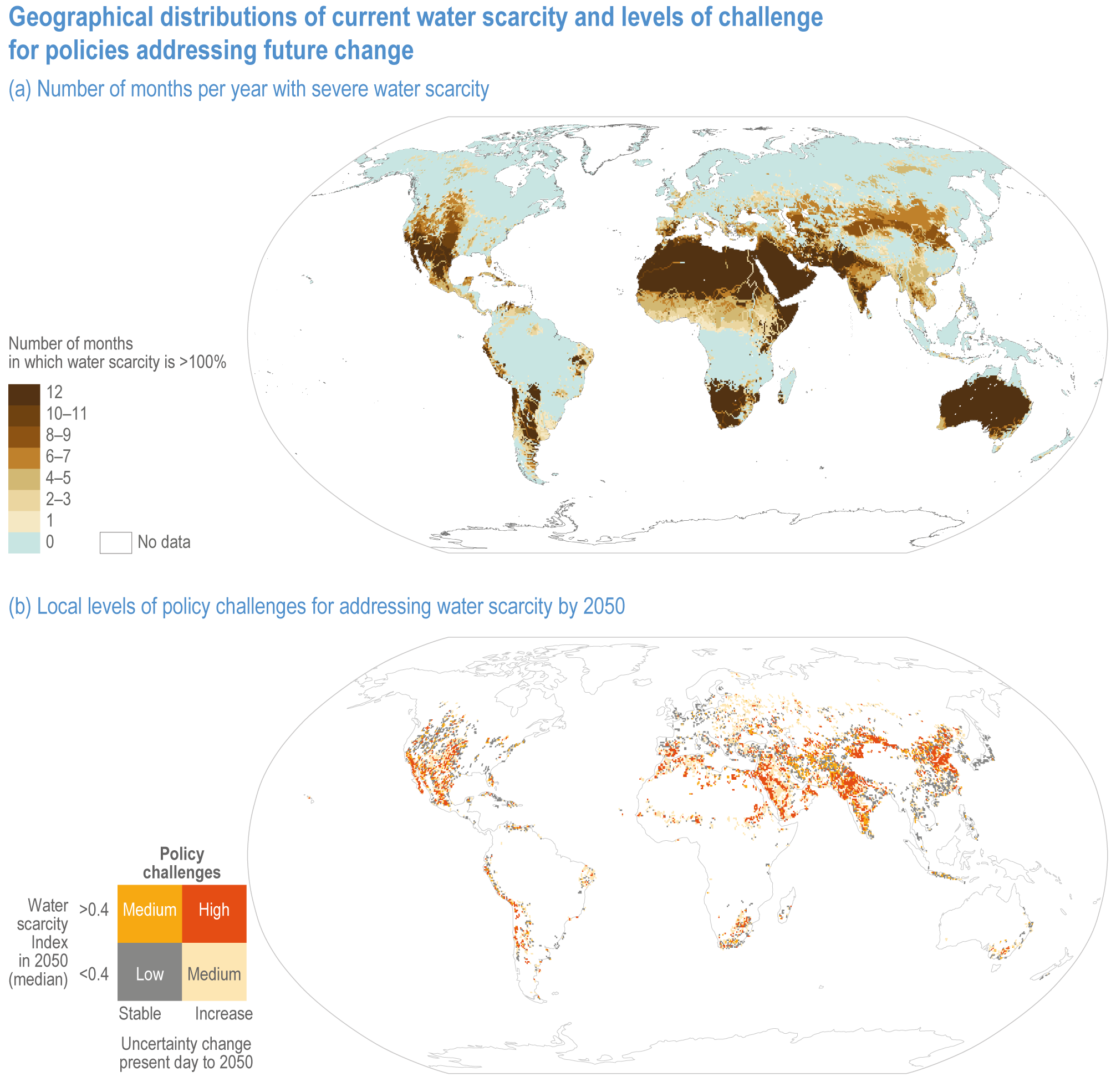
Adaptation and Vulnerability. Sourced from The IPCC
Everyone has a role to play.
"In the case of climate change, water must be at the heart of our plans to mitigate and adapt to the impacts of more extreme and erratic weather."
— Gilbert F. Houngbo, Chairman of UN-Water and Director-General of the International Labour Organization
Additional Resources
1. Ali, U. (n.d.). Quote on boundary disputes between Nigeria and Chad. Referenced in the article. https://dailytrust.com/lake-chad-shrinking-water-increasing-poverty-diminishing-hopes/
2. Bundaram, G. (n.d.). Quote on economic impacts of Lake Chad's drying-https://dailytrust.com/lake-chad-shrinking-water-increasing-poverty-diminishing-hopes/
3. Hayhoe, K. (n.d.). Quote on climate change and humanity. Goodreads. Retrieved from https://www.goodreads.com/work/quotes/87850892-saving-us-a-climate-scientist-s-case-for-hope-and-healing-in-a-divided
4. Houngbo, G. F. (n.d.). Quote on the importance of water in climate change mitigation. ScienceDirect. Retrieved from https://www.sciencedirect.com/science/article/pii/S2590332222000501
5. Ibrahim, A. (n.d.). Quote on fertile land scarcity around Lake Chad. Referenced in the article.https://www.nzgeo.com/stories/as-climate-change-bites-in-chad-hindou-oumarou-ibrahims-participatory-mapping-is-helping-reduce-conflicts-and-protect-resources/.
6. NASA-Department of Defense. (2021). Study on saltwater contamination of coastal groundwater reserves by 2100. Retrieved from https://www.nasa.gov/missions/space-shuttle/srtm/nasa-dod-study-saltwater-to-widely-taint-coastal-groundwater-by-2100/
7. Sonday, N. (n.d.). Statement on urban development impacts on the Cape Flats Aquifer. https://www.dailymaverick.co.za/article/2022-03-31-how-day-zero-drought-and-active-civil-society-saved-the-cape-flats-aquifer/
8. South African Department of Water and Sanitation (DWS). (n.d.). Official data on sustainable water management. https://www.dws.gov.za/
9. University of South Africa. (n.d.). Citizen Science for Water Photo Story Competition. https://www.gov.za/news/media-statements/water-and-sanitation-calls-public-participate-water-photo-story-competition.
10. Water Research Commission & UNESCO’s Intergovernmental Hydrological Programme. (n.d.). Collaborative efforts on water management. https://www.unesco.org/en/ihp.
11. World Meteorological Organization (WMO). (2021). Report on water scarcity projections by 2050. Retrieved from https://library.wmo.int/records/item/56300-state-of-the-global-climate-2021.